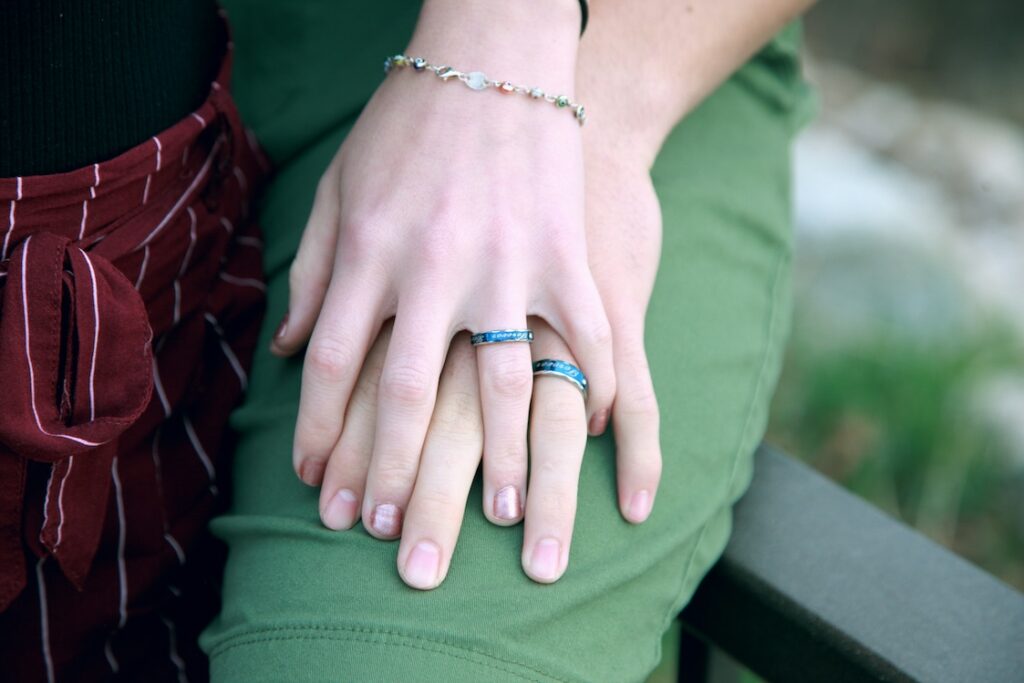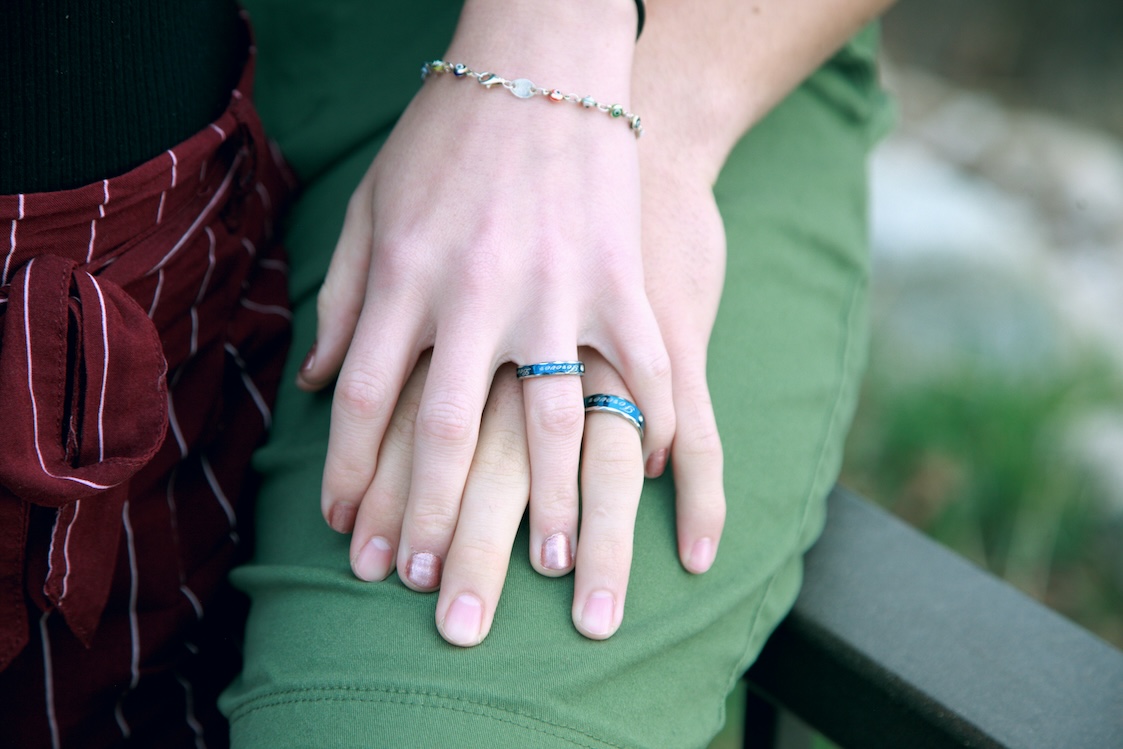A Case for Touch…and Swords
If touch is the primal language, how fluent are you?

In a world saturated with talking-heads, bickering, and social media we can easily forget that touch is the primal language.
I remember my mother softly putting her hands on the back of my shoulders late one summer night when I stepped outside of the front doorway into the night. I was twenty-two…and lost. I asked her to give me something for strength, a talisman of sorts. Months later she would give me a necklace with a pendant of a climbing antelope.
Recently, a neighbor texted me this: “Did I see you jogging up the Pleasant Street hill in the snow and sleet this morning?”
The answer was yes, followed by a joke or two. The real, unsaid answer? I welcome the full sensory experience of harsh weather: the snow melt on my eyelashes; the condensed sleet erupting as vapor from my nose and mouth; the slap-slap of my neon Pumas on the lonely blacktop; the tap-tap of the antelope on my breastbone, reminding me of my mother’s love.
We are wired to keep afloat the splendid and vastly mysterious story of which we are all an equal part. I don’t know what you would call this story, but its central theme is this: what you touch, touches. Even so, we are not merely bucket brigades of energy, transferring equal dollips of energy from one being to the next.
Our acts of touch transcend our intentions.
When touch is involved, there are no impotent gestures. Seemingly small tokens of touch can ignite inestimable consequences.
Waves spawn more waves. You cannot fully predict what will happen when you touch lovingly. You may birth more love. Your touch may awaken old, unhealed pain. Some barriers we fiercely guard. And, of course, un-loving touch–or what Maya Angelou called ‘mis-loving’ touch–can perpetuate chains of hurt.
Indeed, sometimes, hurt people hurt people.
Here’s the rub, friends: I believe we have a responsibility to touch lovingly throughout our lives, consistently and intentionally. It’s a contract we make with life. Life gave us this primal language with which to sing to itself and there is nothing more powerful in this world. We owe it to life—to each other— to wield it well. It is the sword in the stone that we liberated with our youthful innocence, and it can lead us to our holy grails if–IF–we use it lovingly.
The Primal Language

As infants, our vision was dull but our touch receptors sparked like crossed wires. Verbal messages of love and belonging surely penetrated–but not as deeply as touch. Touch held forth in those years. Mother’s skin to your skin. Father’s warmth to your warmth.
We share our nervous system wiring with other mammals. It predates our higher human intellectual faculties, like reasoning, rationality and advanced language, by thousands of years. Watch how lionesses, silverback apes or elephants use touch to soothe their young or to communicate “do this, not that” messages. It’s not that they can’t verbalize–it’s just that touch communicates a purer and cleaner message than spoken language.
Humans are essentially the same. As we age into and through midlife, our wiring doesn’t change, but our ability to muddle the pure and clean message surely does.
Let me offer two important reasons why:
One: Our relationship with closeness changes. By now, you have been jabbed, poked at or pierced by the un-loving sword more than once, however small or large. Our world gets small and we get VERY selective with whom we extend the slightest gesture of touch (not including handshakes!)
Closeness gets uncomfortable if you don’t live in a culture that actively encourages it. But interestingly, this is not so for most young people and often not for many elderly, either. They love touch! Watch little kids playing with each other–it’s a veritable loving touch-a-thon. Walk through an elderly home and behold the fingers and hands reaching out towards you from beds and wheelchairs–and trace them back to the most child-like smiles you will ever see.
But in the middle years of life, fear of vulnerability reigns. We calculate and control proximity to EVERYONE in our lives. One of the ways in which we do this leads us to the second important change that happens:
Two: We over-rely on the spoken word. If you swim in what sociologists call “low-context” cultures, you’ll know what I mean. Low-context cultures are ones that over-emphasize verbal communication and intellectualizing over other forms. Exhibit A: White, European-derived cultures.
“High-context” cultures, conversely, are masters of non-verbal communication: gestures, intuition, touch, etc. Exhibit B: LatinX, many Indigenous and African-derived cultures, among others.
Recently, I made a case for how to embrace the inevitable loneliness that happens in partnerships. Not all midlife loneliness is inevitable, though. Take a guess how you can singe the fringes of a draping loneliness?
Right on.
I know. I know. Some prefer their emotional expressions muddied, however loving they are at root. One of the cultures in which I was raised was a low-context culture that practiced elaborate ways of avoiding loving touch. Everyone seemed to be in their heads and in their words, recycling the same phrases and distanced gestures that upheld the social protocol to at least act caring. As a boy, I was so confused. The men were the worst–essentially emotional tree trunks–unless they were highly drunk. Inhibitions dropped, they’d throw fists or hug you. No wonder I became a bartender.
One weekend night in my early twenties while tending bar at a busy neighborhood seafood joint, I paused and surveyed the drunken rowdyness. Every person was either arguing, fighting, smooching or hugging. All were touching. This is a love fest, I realized. Then I got shit-faced on Crown Royal and joined them. For a few years, it was the “touching” family I needed.
That night ended like many others back then:
I love you man (arms around one another).
Now let’s go light some shit on fire!
Stupid. Touching. Loving.
A Case for Courage and Swords
What is your policy on touch?
I’m not talking about petting your loving golden retriever or pruning your luscious herb garden. People! What is your policy on touching people? You have one. We all do. And too much of it is driven by fear.
Let me make a case: We need to physically touch people. Wield your sword with compassion and courage. Every touching gesture is a heartbeat away from spawning a sweet symphony…even if you never hear it.
Let us use our hands and arms to deliver a purer, cleaner message. Let us drop pebbles into oceans and trust the ripples. Let us communicate to the lucky recipients of our touch that we are upholding our end of the divine bargain with life, that our relational conduct is governed by courage and love, not fear.
Let’s get touchy…
Hold high the lanterns, friends.
-Chuck










